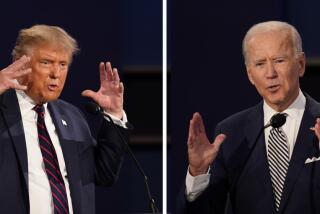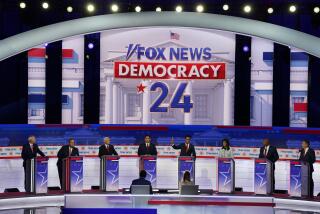George Allen’s curse
- Share via
The most important word uttered in the Republican presidential primary has not been “terrorism” or “taxes,” not “faith” or “family.” Rather, it was “macaca.”
Two years ago, conventional Beltway wisdom had Sen. George Allen of Virginia easily winning reelection and becoming the presumptive front-runner for the 2008 GOP presidential nomination. He had been embraced by the Republican business and fundraising establishment, as well as by the social and religious conservative voters who represent the strength of the party’s grass roots.
But when he uttered what many considered to be an ethnic slur against an opponent’s staffer, Allen’s Senate reelection campaign began a downward spiral from which he never recovered. Instead of touring Iowa and New Hampshire as a conquering hero, he returned to his home state as a private citizen, leaving a vacuum atop the GOP field that fundamentally shaped the race.
Unlike Democrats, who seem to enjoy the muddle of a free-for-all primary season every four years, we Republicans have generally been much more hierarchical as we choose our presidential standard-bearers. Early in the campaign cycle, we identify the party’s establishment candidate, shower him with money and endorsements, and anoint him as the likely nominee months before any primary. It’s a very efficient process: Seven of the last 10 GOP nominees have been elected president.
But Allen’s premature departure from the field left us without a front-runner. And unlike our friends across the aisle, we’re not very good at chaos. The result has been a string of candidates, each not entirely comfortable with either the party establishment or grass roots, each attempting to remake himself to fit the preferences of those two groups. John McCain started out with the inside track to becoming the likely Republican nominee, followed in turn by Rudy Giuliani, Fred Thompson, Mitt Romney and Mike Huckabee. (Romney and McCain have had multiple shots at front-runner status, while the jury’s still out on whether Giuliani will get another chance.)
Each of the five leading Republicans has stumbled at some point because of his efforts to position himself as someone other than what his biography would suggest. If Allen had entered the race as the preferred candidate of both the party establishment and religious conservatives -- as George W. Bush did eight years ago -- the nature of the campaign would have been very different.
Romney would have run as the pragmatic problem-solver whose business experience allowed him to save the 2002 Winter Olympics and later govern Massachusetts by working with Democrats to reform the state’s healthcare system. Giuliani would have run as the solid centrist who combined inspirational leadership, strong anti-terrorism credentials and social moderation. Both have instead struggled to convince religious conservatives of their purity on a range of cultural issues that have been incidental, to this point, in their political careers. Huckabee would have long since retreated to the sidelines, and Thompson might very well have skipped the race altogether.
Most intriguing was the effect that Allen’s absence had on McCain, who could have reprised his role as the reformer and outsider who tilted at Washington windmills in his 2000 campaign. Instead, McCain attempted to run a gold-plated campaign designed to appeal to the Bush-Cheney donor base, an effort that resulted in his political near-death experience last summer. Ironically, it was that meltdown that forced him to abandon his efforts to run an establishment-oriented campaign and return to the straight talk and populist strategy that have brought him back to the front of the pack in New Hampshire public opinion polls.
The temptation for all of these men to remake themselves is understandable: It’s been almost half a century since the Republican nominee was not selected by the party leadership. But although the opening that presented itself was alluring, it’s a political version of fool’s gold. Voters are smart enough to recognize artificiality when they see it, which is one of the primary factors for the comparative lack of enthusiasm among GOP partisans.
It’s far too soon to tell whether McCain’s decision to run as himself will gain him the nomination. But if he is defeated, it’s going to be at the hands of an opponent who will have made the same decision -- realizing that voters will always pick a leader who’s comfortable in his own skin over someone who tries to fit into somebody else’s.
More to Read
Get the L.A. Times Politics newsletter
Deeply reported insights into legislation, politics and policy from Sacramento, Washington and beyond. In your inbox twice per week.
You may occasionally receive promotional content from the Los Angeles Times.









